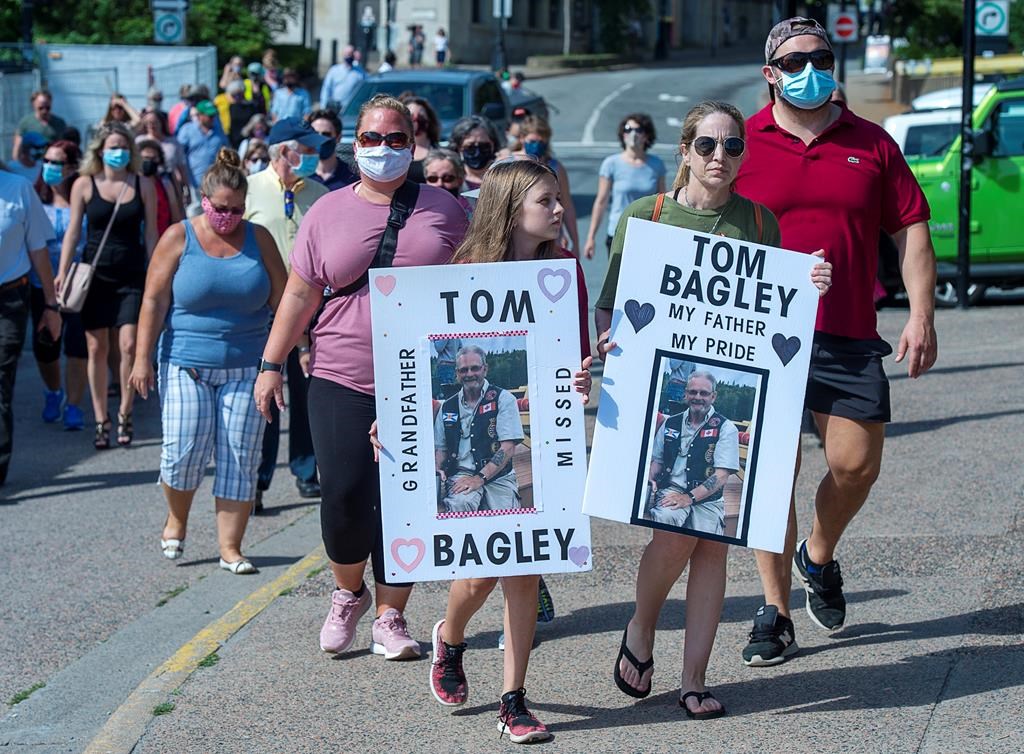As work begins on the public inquiry into April’s mass shooting, some Nova Scotians say they’re optimistic the process will produce results and bring healing for those impacted by the tragedy.

On Thursday, the provincial and federal governments released terms of reference for the inquiry, which will probe the RCMP’s response to the active shooter scenario, their public communications after the attack, and any contextual factors that may have spurred the gunman to commit such violence.
“Healing is very painful because you do have to drag up the past, you do have to remember how you were treated, what happened and what those feelings were,” said Truro-based human rights activist Linda MacDonald, who has counselled women and some men who have suffered abuse.
“But unless you do that, you’re stuck with that simmering wound for the rest of your life, so as hard as healing is and as painful as it is, it’s much more liberating than to ignore it and hide it away in a dark space.”
Earlier this year, the families of the 22 people killed during a gunman’s rampage on April 18 and 19 led protests in favour of a public inquiry. They rejected the initial, government-ordered review, which would not have been able to compel witnesses or evidence, and may have been held partially behind closed doors.
- Life in the forest: How Stanley Park’s longest resident survived a changing landscape
- ‘Love at first sight’: Snow leopard at Toronto Zoo pregnant for 1st time
- Carbon rebate labelling in bank deposits fuelling confusion, minister says
- Buzz kill? Gen Z less interested in coffee than older Canadians, survey shows
The inquiry, now in its early stages of setting up in Nova Scotia, cannot compel governments to implement its recommendations, but Cumberland-Colchester MP Lenore Zann said she’s confident both Ottawa and the province will be keen to make changes.
“This is about doing what’s right. This is about keeping Nova Scotians safe and this is about making sure something so horrific that did occur cannot happen again, or at least to the very best of our abilities trying to prevent,” she told Global News. “So as the MP for the area, I’ll definitely be pushing for that.”
Archie Kaiser, a law professor at Dalhousie University, said it’s not surprising or unusual for the inquiry to lack binding recommendations. He hopes, however, that its three commissioners suggest some kind of accountability measure for governments in their final report, due on Nov. 1, 2022.
“I hope they will recommend there will be an annual report card that will provided by government to the public to account for the level of implementation,” he said.
Governments will also have to explain themselves if they fail to take meaningful action when the inquiry is complete, added Nova Scotia Senator Stan Kutcher.

“The thing I find best in the process at this point is that it is in the public interest and it is under public scrutiny,” Kutcher explained.
“So it would to my mind, engender quite a challenge for any government — be that federal or provincial — to clearly ignore findings that come from this inquiry, if the public is determined that those findings not be ignored.”
Advocates for women and human rights, including Zann and MacDonald, said they’re also encouraged that an analysis of “contributing and contextual factors including the involvement of gender-based and intimate partner violence” is included in the inquiry’s mandate.
It’s not the full “feminist lens” MacDonald wanted, but she said she’s hopeful commissioners will use a broad interpretation in their examination of the root causes of the attack. If organizations like hers — Persons Against Non-State Torture — are allowed to testify as part of the inquiry, she added, they’ll ensure misogyny and its role in femicide and mass shootings are discussed.
“(A feminist lens) is a much broader lens than looking at the gender-based violence of the shooter,” said MacDonald. “It’s broader than looking at how the police dealt with the shooter, it’s looking at how we can help bystanders come forward and feel safe to report misogyny and violence against women.”

Kaiser said the commissioners will have the “interpretive latitude” to add topics to their probe and take the inquiry in more expansive directions than explicitly stated in the terms of reference.
“I think one way or the other, they could add additional items for exploration because they’re mandated to look at the context (of the shooting),” he said. “That would enable them to say, ‘Oh, in order to look at police combat gear, we also have to add in another contextual element.'”
There is no start date for the public inquiry’s hearings, but a news statement released on Thursday said the commissioners will soon begin the work of setting up a secretariat in Nova Scotia.
The commissioners, a media contact for the inquiry, Federal Public Safety Minister Bill Blair and Nova Scotia Justice Minister Mark Furey all declined comment on this story.




Comments